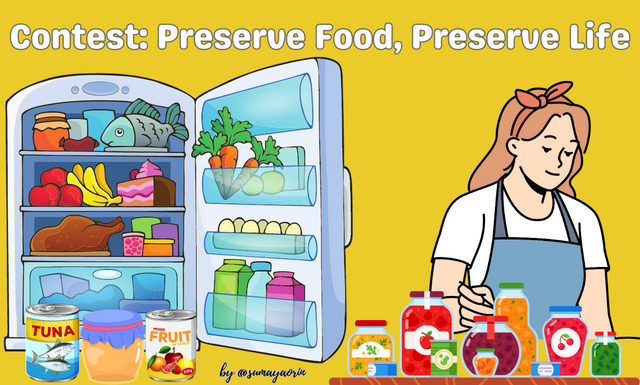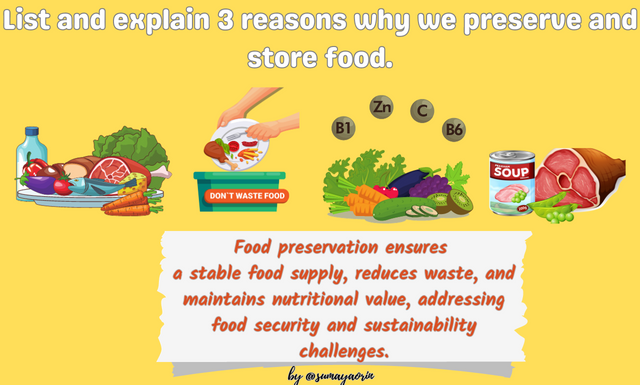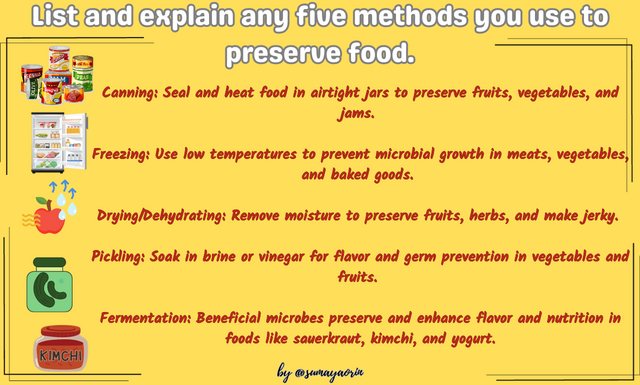I'm @sumayaorin , from #Bangladesh

Image made by Canva |
|---|

Hello everyone! I hope you all are having a great time and in good health.I am thrilled to be a part of this contest "Preserve Food, Preserve Life." The topic has informative and beneficial issue of discussion that I am excited to address. I am going to explain my perspective on the subject , and also curious to hear from others. Which I think will be beneficial to me.
Food Security: Food preservation helps ensure a stable food supply, especially during times of scarcity or emergencies. By storing and preserving surplus food, we can bridge the gap between harvest seasons and prevent food shortages.
Reducing Food Waste: One of the critical challenges today is food wastage. Preserving food extends its shelf life , reducing the chances of it going to waste. This not only saves resources and lessens the environmental impact of food production but also saves our money.
Maintaining Nutritional Value: Food preservation methods, such as canning or freezing, help maintain the nutritional content of food over time. This is crucial for providing nutritious meals year-round, especially in regions with seasonal variations in food availability.
Canning : Canning involves sealing and preserve food in airtight containers , typically glass jars , and then heating them to kill bacteria and prevent spoilage. This method is excellent for preserving fruits , vegetables , and jams.
Freezing : Freezing is a simple and effective approach to preserve a wide variety of foods, from meats and vegetables to baked goods. Low temperatures prevent the growth of microbes and enzymes that ruin food.
Drying/Dehydrating : Dehydrating food removes its moisture content, preventing the growth of bacteria and fungi. This method is great for preserving fruits , herbs , and even making homemade jerky.
Pickling : The process of soaking vegetables or fruits in a brine or vinegar solution is known as pickling. This imparts a distinct flavor, and it also creates an acidic environment, which prevents the growth of potentially harmful germs .
Fermentation: Fermentation is a natural preservation mechanism in which beneficial bacteria , yeast , or molds thrive in food. This method not only preserves food, but it can also improve its flavor and nutritional content. Sauerkraut , kimchi, and yogurt are a few examples.
In conclusion, food preservation is a vital practice that serves multiple purposes , including ensuring food security, reducing food waste , and maintaining nutritional value. By employing methods like canning, freezing , drying , pickling , and fermentation, we can extend the lifespan of our food, making it available and enjoyable year-round. I'm excited to learn more about the innovative ways others preserve food to preserve life during this contest!
I would like to invite my friends @goodybest
@ridwant @dove11 @radjasalmanto participate in this contest.
.png)
Image made by Canva |
|---|

Firstly , let me explain what I understand by food preservation. Food preservation is the practice of preventing food from spoiling or deteriorating , ensuring it remains safe to eat for an extended period. This process involves various techniques and methods to maintain the quality , taste, and nutritional value of food products.

Image made by Canva |
|---|

Now, let's dive into three essential reasons why we preserve and store food:
Food Security: Food preservation helps ensure a stable food supply, especially during times of scarcity or emergencies. By storing and preserving surplus food, we can bridge the gap between harvest seasons and prevent food shortages.
Reducing Food Waste: One of the critical challenges today is food wastage. Preserving food extends its shelf life , reducing the chances of it going to waste. This not only saves resources and lessens the environmental impact of food production but also saves our money.
Maintaining Nutritional Value: Food preservation methods, such as canning or freezing, help maintain the nutritional content of food over time. This is crucial for providing nutritious meals year-round, especially in regions with seasonal variations in food availability.

Image made by Canva |
|---|

Next , I'd like to share five methods I use to preserve food:
Canning : Canning involves sealing and preserve food in airtight containers , typically glass jars , and then heating them to kill bacteria and prevent spoilage. This method is excellent for preserving fruits , vegetables , and jams.
Freezing : Freezing is a simple and effective approach to preserve a wide variety of foods, from meats and vegetables to baked goods. Low temperatures prevent the growth of microbes and enzymes that ruin food.
Drying/Dehydrating : Dehydrating food removes its moisture content, preventing the growth of bacteria and fungi. This method is great for preserving fruits , herbs , and even making homemade jerky.
Pickling : The process of soaking vegetables or fruits in a brine or vinegar solution is known as pickling. This imparts a distinct flavor, and it also creates an acidic environment, which prevents the growth of potentially harmful germs .
Fermentation: Fermentation is a natural preservation mechanism in which beneficial bacteria , yeast , or molds thrive in food. This method not only preserves food, but it can also improve its flavor and nutritional content. Sauerkraut , kimchi, and yogurt are a few examples.
In conclusion, food preservation is a vital practice that serves multiple purposes , including ensuring food security, reducing food waste , and maintaining nutritional value. By employing methods like canning, freezing , drying , pickling , and fermentation, we can extend the lifespan of our food, making it available and enjoyable year-round. I'm excited to learn more about the innovative ways others preserve food to preserve life during this contest!

@ridwant @dove11 @radjasalmanto participate in this contest.



My X/Twitter share
Downvoting a post can decrease pending rewards and make it less visible. Common reasons:
Submit